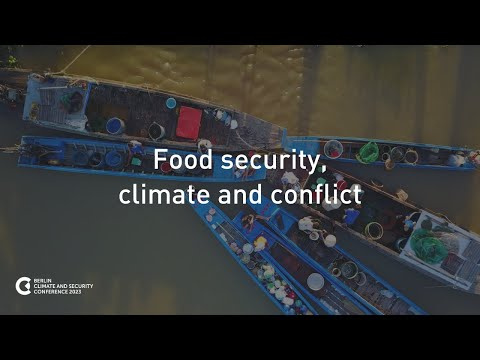Food Security

Almost 690 million people – 9 percent of the world’s population – are hungry. Although this is less than in the 1970s, food security is still a tremendous challenge. The World Health Organisation blames conflict and climate-related shocks for recent spikes in malnutrition and food insecurity.
If current consumption trends and trends in food loss and waste continue, we will need to dedicate even more natural resources to satisfy demand as the world population grows. The global rise of the urban middle-income class is shifting dietary preferences towards more meat and dairy products, which are particularly resource-intensive.
Climate and Food Security

While intensive and extensive agricultural practices accelerate climate change, climate-related impacts reduce yields and make massive crop losses more and more common. Other detrimental ways in which modern agriculture interacts with climate include:
- The global food system accounts for about 21–37% of total greenhouse gas emissions, thus contributing to climate change, which, in turn, stresses agriculture’s most important inputs: land and water.
- Agriculture, both commercial and subsistence, is the biggest driver of deforestation in developing regions. Besides fueling climate change, this also threatens ecosystems crucial to food security.
- A recent IPCC report attributes most global soil degradation and loss of natural resources during the second half of the 20th century to intensive agriculture.
- Some 70% of all fresh surface and groundwater we remove is used for irrigation, most of which is unsustainable. Over-pumping of aquifers is causing groundwater tables to fall precipitously in many areas.
Another great challenge is access to food: most people are hungry not because there is not enough food, but because they do not have the physical or economic means to procure food. When addressing food security, governments and international institutions tend to put emphasis on the need to increase food production and availability, citing prospective population growth, as well as increasing food demand and consumption.
However, availability is only one of the four pillars of food security; access to food, adequate food utilization and long-term stability are just as important. When food production does not consider all four dimensions, it can even be harmful by making food physically distant or unaffordable, negatively affecting food variety and nutrient availability in food and soil, and depleting resources needed for future food production.

Fostering healthy global interdependencies in the food sector can help develop and maintain sustainability standards, reduce food losses at the production level and close regional supply gaps, simultaneously addressing food security and reducing agriculture’s climate footprint. Subsistence farming is still the main source of livelihood for hundreds of millions of people. These are among the most vulnerable to climate change, especially where farming depends on precipitation.
READ: Editor’s pick: 10 Food Conflicts from Morocco to North Korea
In brief, although the precise causal mechanisms of how climate change impacts food security vary and are sometimes contested, they constitute plausible risks for peace and stability. Global governance and climate diplomacy can support the efforts to stabilise food systems through climate change mitigation, improved access to food, land restoration and refining early warning action systems, for example, by coordinating the responses, reforming trade regimes and establishing equitable insurance schemes.
WATCH
When designing food security interventions, it is extremely important to speak to people who are working on conflict and people in the communities to understand what are the dynamics and to play out scenarios of possible repercussions.
explore case studies on food security
Case Study: Global Food Price Shocks

This case study from our factbook highlights the factors leading to global food-price shocks, explains how the impacts of food price spikes differ depending on countries and points out the risks of such shocks leading to situations of fragility.

